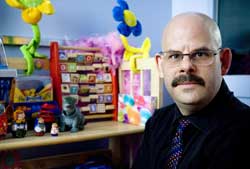Post-partum depression has impact on children
Effects continue long after treatment

David Forman has demonstrated that the effects of post-partum depression extend beyond the period directly affecting the new mother.
Photo by Andrew Dobrowolskyj
Postpartum depression can have lasting effects on newborns long after their mothers have recovered, according to the first North American study of its kind published by David Forman (Psychology).
Forman, who holds the Canada Research Chair in Human Development, led a team of researchers from the University of Iowa to test a drug-free therapy program to help mothers recover from depression and improve their parenting outlooks.
“A mother’s view of her child remains surprisingly constant over time — like a self-fulfilling prophecy,” Forman said. “If she finds her newborn difficult that baby can grow up to be a difficult child or teenager.”
In the latest issue of the prestigious journal Development and Psychopathology, Forman and his team admit they were surprised to discover that successful therapy for mothers with postpartum depression was not enough to foster good relations with their babies and that a mother's early impressions of her newborn could linger for years.
“These results are important, as postpartum mothers are more likely to have negative views of their babies, such as finding their newborns fussy,” Forman explained. Data collection for his research was funded with a grant from the U.S.-based National Institute of Mental Health while he was completing his PhD at the University of Iowa.
The 18-month study followed 157 women who were recruited from middle-class communities across the Iowa City region. Participants included depressed and non-depressed mothers who were given interpersonal psychotherapy, a short-term treatment effective at relieving postpartum depression.
Forman’s research team then visited mothers at their homes at six months, nine months and shortly after babies turned two. Mothers filled out questionnaires and were videotaped doing simple tasks such as changing diapers or bathing their infants.
A common denominator among recovered postpartum mothers was how they continued to rate their babies as very fussy. By age two, children of depressed mothers were more likely to show behaviour problems than children of other mothers.
“Even though all depressed mothers received treatment and most were symptom-free, postpartum mothers reported their toddlers as less securely attached,” Forman said.
Michael W. O'Hara, who co-authored the study, says their findings are relevant to all women because 19 per cent of mothers around the world experience major to minor postpartum depression.
“It’s not sufficient to only treat depression in mothers,” said O’Hara, a professor of psychology in the University of Iowa College of Liberal Arts and Sciences and co-director of the Iowa Depression and Clinical Research Center. “The bottom line is that clinicians working with depressed mothers should address a mother’s attitudes towards her child through parental counselling.”
Forman, who is also affiliated with the Centre for Research in Human Development, says his study was launched with the primary goal of uncovering clues into human development. “I’m interested in finding out how we get to be who we are,” he said. An ideal place to begin was with newborns, since babies generally spend more time with their mothers than anyone else.
“That’s why children need to be part of the equation when treating postpartum mothers,” Forman said. “We should never assume that babies will be fine once postpartum mothers begin feeling better.”